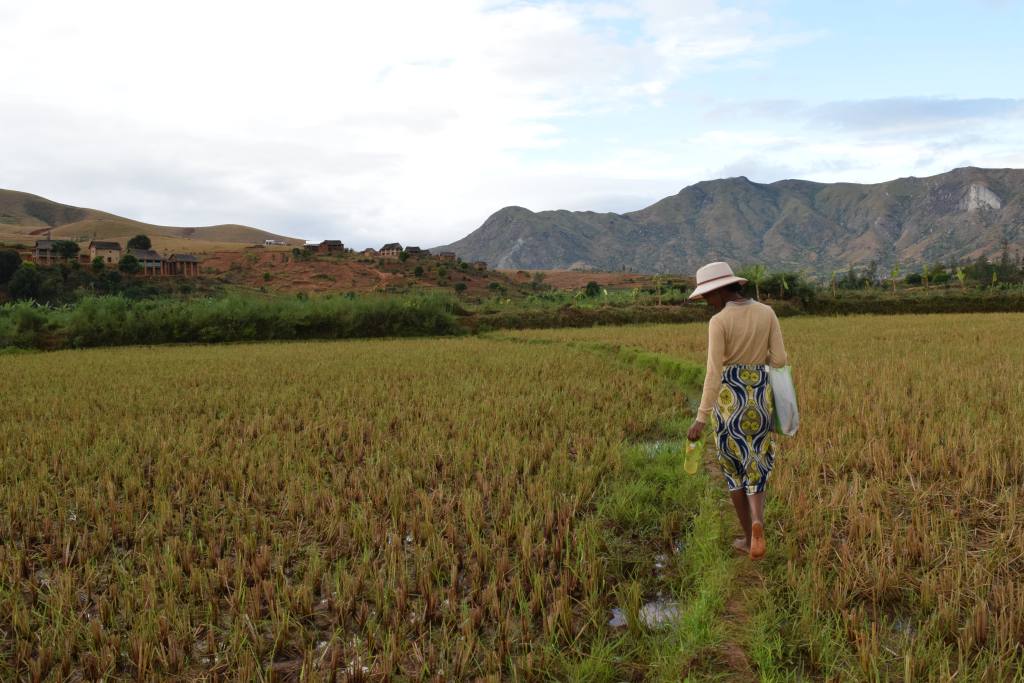
Three weeks before Fanja’s wedding, she and I set out to visit an ombiasa, a Malagasy witch. Our aim was to determine which date would be the best day to hold Fanja’s wedding.
Over the past two years, I’ve heard about the ombiasa. But until May, I had never met one in person.
The ombiasa plays a significant role in the lives of rural Malagasy people. They are consulted about illnesses, where to build new homes, and the scheduling of important life events. Ombiasas are also sought out for protective charms for dangers such as theft and lightning.
Conversely, there also exist bad ombiasas who offer to place curses on others.
An ombiasa isn’t taught, I learned that day. Rather, the gift is divinely bestowed by Zanahary, Madagascar’s revered ancestors.
Despite the spread of Christianity, ombiasas remain widely sought after in rural Madagascar. While some Christians have denounced the work of the ombiasa, for many other devoted Christians, like my host sister, religion and traditional Malagasy practices continue to coexist side by side.
My host sister says there are many people who claim to be ombiasas, however true ombiasas are rare.
After walking south for nearly two hours, we finally reached the ombiasa’s compound. Set apart from surrounding villages, we approached the walled-in buildings built on the top of a grassy slope.
Fanja had been there before, so she knew where to go. We climbed two ladders up to the third floor and entered the ombiasa’s chamber.
It was unremarkable in nearly every way. The room measured roughly 10 feet by 10 feet, with light blue walls, a single window to let in light, and a raffia mat to cover the concrete floor on which we sat. The gusts of wind outside caused the house to creak.
To the far corner sat the ombiasa, a woman in her 40s with small, tightly woven braids twisted into two buns at the base of her neck. She wore colorful beads around her neck and small golden hoops in her ears.
To her left was a collection of wood. Some pieces of wood were short, the length of a hand, while others were long and twisted. The only place I had ever seen similar kinds of wood was in the traditional Malagasy medicine section of the market in Ambalavao.
At the time we walked in, the ombiasa was in the midst of talking with a woman, who was seeking treatment for a lingering illness. After listening to the women’s concerns, the ombiasa stared into a small, pink plastic mirror propped up on the ground, then carefully began shaving small pieces of wood onto a piece of paper. The wood shavings were to be boiled into a tea and then drank.
The woman paid some money, took the wood shavings and left.
When it was Fanja’s turn, she and the ombiasa started off with small talk.
“Who are your parents?” she asked. “Where do you live?”
The conversation soon turned to Fanja’s wedding. A few dates were tossed out, before Fanja and the ombiasa settled on June 12. This date was approved only after the ombiasa once more stared into her mirror.
Later, I learned that the ombiasa was conversing with people in the mirror that only she could see and hear. The ancestors provide the advice, and the ombiasa is the one who conveys it to the living.
I’m not going to claim to be an ombiasa or a witch. But weeks ago, I told Fanja that the ombiasa would select June 11 or 12, and I was just a little smug to be proven right.
How did I know? Fanja told me that the most fortuitous day to hold a wedding is the one near the full moon, when the night is the brightest. So I pulled out my cellphone, checked the lunar charts, and told her that if the moon was the criteria, it would happen on June 11 or 12.
Fanja received some wood shavings to protect against curses from those who wish her and her husband ill. Then she thanked the ombiasa and we left.
I would have loved to have taken photos of the ombiasa, her tools, and the room she practiced in. I even brought my Nikon. But she refused when I asked to take photos, and I honored her wishes.
Before I left, however, I got her phone number. Now, whether I’m in Madagascar or the United States, I can give her a call.
Will I? Probably not. But how cool is it to know that I could?
We invite you to add your comments. We encourage a thoughtful exchange of ideas and information on this website. By joining the conversation, you are agreeing to our commenting policy and terms of use. More information is found on our FAQs. You can modify your screen name here.
Comments are managed by our staff during regular business hours Monday through Friday as well as limited hours on Saturday and Sunday. Comments held for moderation outside of those hours may take longer to approve.
Join the Conversation
Please sign into your Sun Journal account to participate in conversations below. If you do not have an account, you can register or subscribe. Questions? Please see our FAQs.